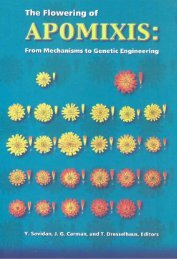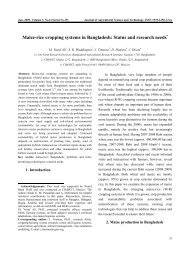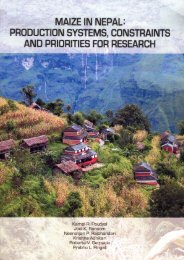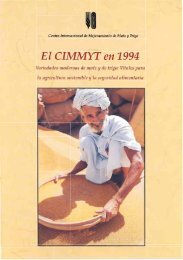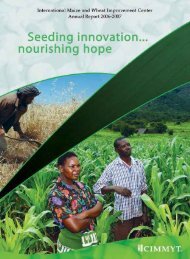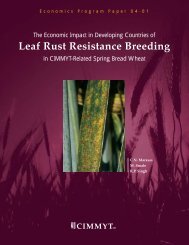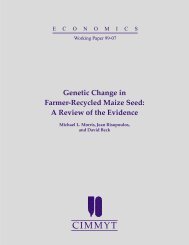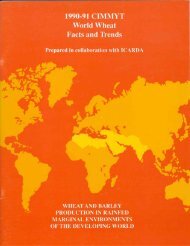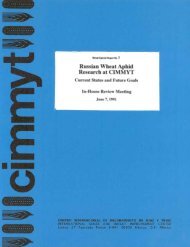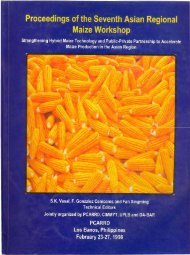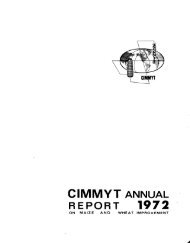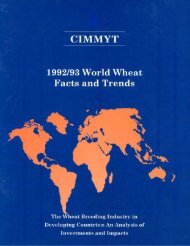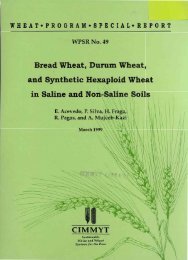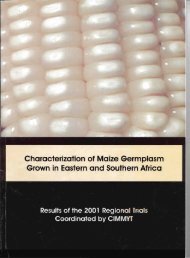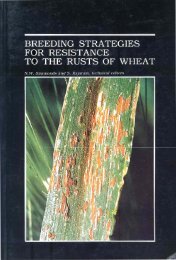Proceedings of the Fifth Asian Regional Maize Workshop - Search ...
Proceedings of the Fifth Asian Regional Maize Workshop - Search ...
Proceedings of the Fifth Asian Regional Maize Workshop - Search ...
You also want an ePaper? Increase the reach of your titles
YUMPU automatically turns print PDFs into web optimized ePapers that Google loves.
To recover value, seed companies can <strong>the</strong>oretically charge an amount up to, but not exceeding,<br />
<strong>the</strong> value <strong>the</strong>y add. Farmer benefit is a function <strong>of</strong> <strong>the</strong> value added to improved seed. The<br />
farmer should not get less than 3 times (preferably 5 to 6 times) <strong>the</strong> return on his investment in<br />
seed. Depending upon <strong>the</strong> complexity <strong>of</strong> <strong>the</strong> cross and <strong>the</strong> amount <strong>of</strong> value added, hybrid seed is<br />
generally priced at 10 to 30 times <strong>the</strong> value <strong>of</strong> <strong>the</strong> crop's commodity price.<br />
If a seed company is to become successful, farmers must share in <strong>the</strong> value added (farmer's<br />
benefit). The seed grower must benefit by earning more than what he would from a commercial<br />
crop. And, <strong>the</strong> seed company must benefit by earning an acceptable return on investment. Farmers<br />
will pay for hybrid seed if it benefits <strong>the</strong>m regardless <strong>of</strong> its price premium. Farmers in <strong>the</strong><br />
developing world have centuries <strong>of</strong> crop growing experience, even if <strong>the</strong>y may lack <strong>the</strong> formal<br />
education <strong>of</strong> <strong>the</strong>ir colleagues in <strong>the</strong> developed world. Higher input levels are no disincentive to<br />
use <strong>of</strong> hybrids.<br />
Key words: Hybrid - Seed - Industry, IPR, PVR, UPOV convention.<br />
Intnoduction<br />
The seed industry in <strong>the</strong> developing countries is in an embryonic growth stage. Seed<br />
companies in those countries are typically small fami1y-owned businesses. They generally focus<br />
on multiplying and distributing seed originating from <strong>the</strong> National Agricultural Research Systems<br />
(NARS) and/or <strong>the</strong> International Agricultural Research Centers (lARes).<br />
By contrast, <strong>the</strong> seed industry <strong>of</strong> <strong>the</strong> developed world is mature. It is going through a<br />
period <strong>of</strong> transition involving globalization, restructuring and consolidation. New technologies,<br />
particularly biotechnology have, in recent years, driven this structural change. These technologies<br />
have led to shifting alliances between established seed companies and to links with complimentary<br />
industries. The acquisitions <strong>of</strong> seed firms by agrichemica1 companies, and <strong>the</strong> strategic<br />
alliances being forged between <strong>the</strong>m and food processors and biotechnology firms are notable<br />
examples.<br />
In <strong>the</strong> late 1970's and early 1980's, many multinationals (MNCs) determined that seed would<br />
be <strong>the</strong> primary carrier <strong>of</strong> new technologies and <strong>the</strong>refore began to aggressively acquire seed<br />
businesses (Table 1). By acquiring those businesses, MNCs hoped to capture margins along <strong>the</strong><br />
length <strong>of</strong> <strong>the</strong> agribusiness chain, from <strong>the</strong> laboratory to <strong>the</strong> farmer.<br />
Table 1.<br />
seed industry acquisition and merger mania - 1970s and 1980s (selected examples).<br />
Multinational<br />
Acquired company<br />
Ciba-Geigy<br />
Dow Chemical<br />
Elf Acquitaine (San<strong>of</strong>i)<br />
Hoechst<br />
ICI<br />
Funk Seed International<br />
United Agriseeds<br />
Dahlgren, King Agro, France Canada Semence<br />
Nunhems, Canners, Hi1d<br />
Garst, SES, Sinclair Mc Gill, Mi1n Marsters,<br />
Edw. J. Funk<br />
Contiseeds,<br />
Lubrizo1<br />
Rhone Poulenc<br />
Sandoz<br />
Upjohn<br />
Agrigenetics, (Jacques, McCurdy, Lynnville, Sigco)<br />
Callahan, Clause (50%), Harris-Moran (50%)<br />
Northrup King, Stauffer Seed, Vaughans, Hilleshog,<br />
Weibull, Sluis &Groot<br />
Asgrow, O's Gold, Bruinsma<br />
226



